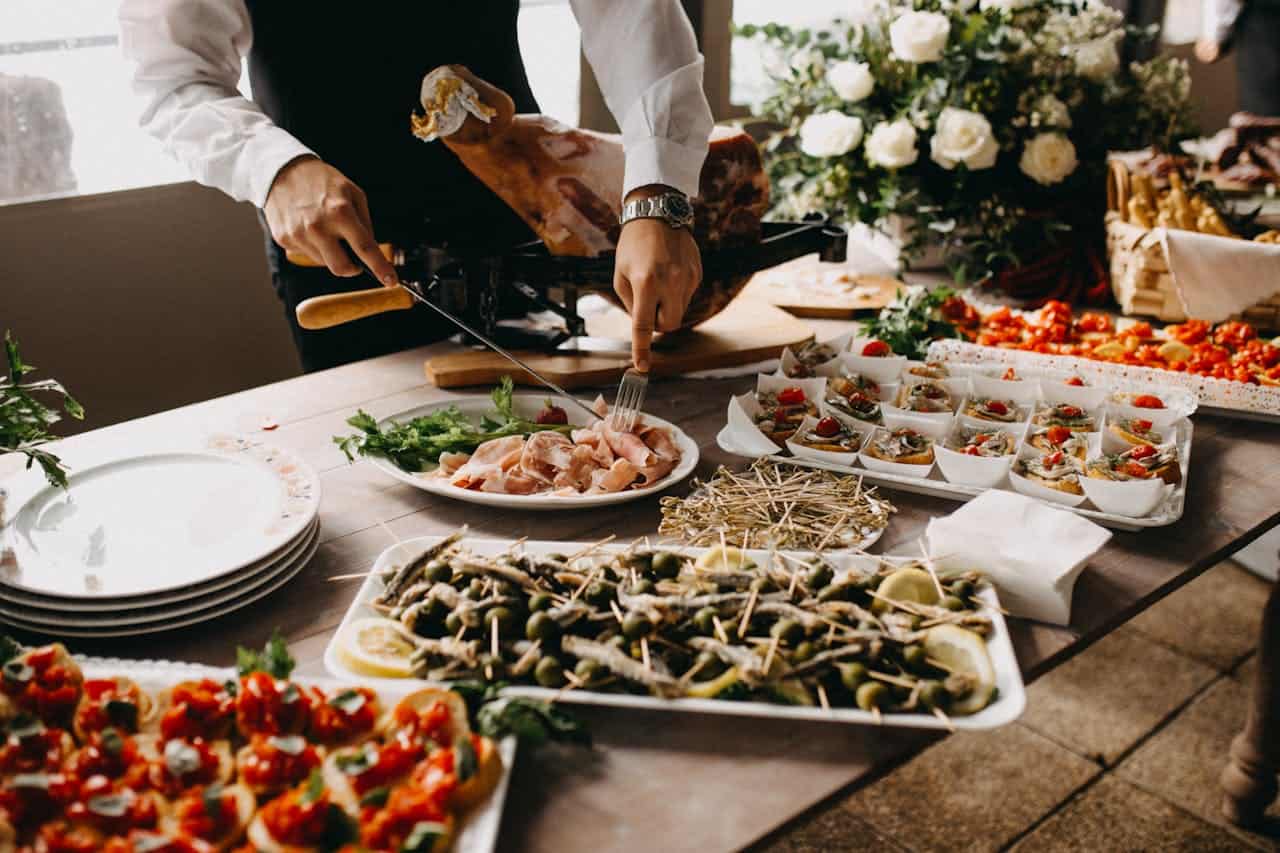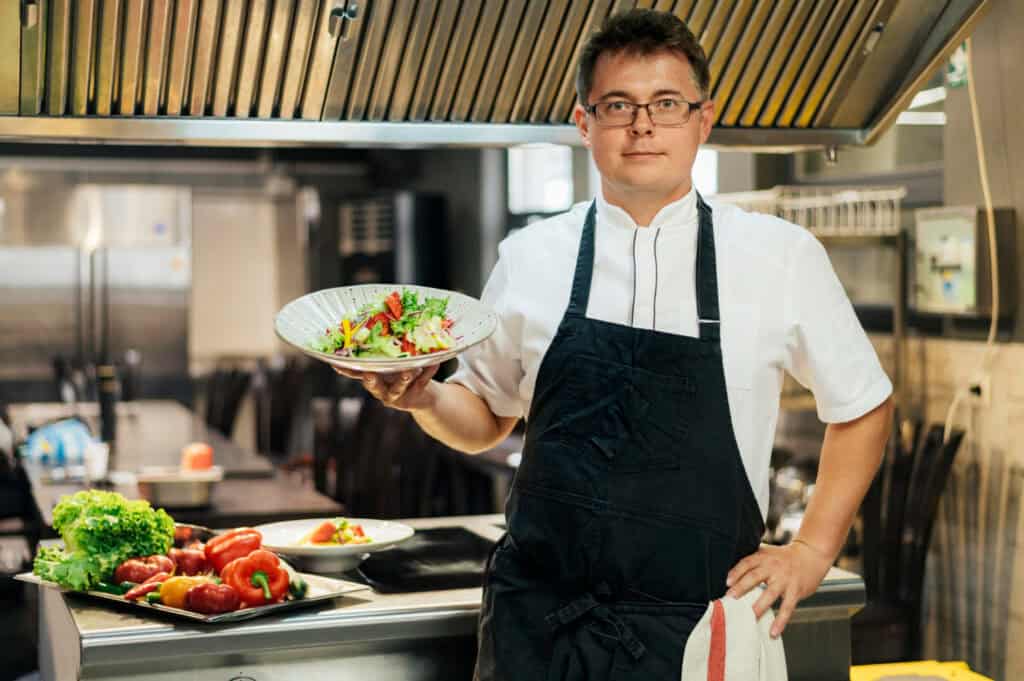
By Jermaine Thomas March 7, 2025
Special diet catering is now a necessary component of the food service industry rather than a niche need. Professional caterers must make sure that their menus are inclusive and safe for all guests as awareness of food allergies, intolerances, and lifestyle-driven dietary choices increases. Planning gluten-free events, providing vegan catering options, and accommodating food allergies are all challenges that a skilled caterer must expertly handle.
In this article, we will explore how catering professionals handle dietary restrictions, create custom menus, and maintain high food safety standards. Understanding the nuances of dietary catering ensures that every guest enjoys their meal without health risks or compromises.
Understanding Dietary Restrictions in Catering
Navigating dietary restrictions requires a combination of knowledge, flexibility, and a proactive approach. By understanding the unique needs of guests, caterers can create inclusive dining experiences that cater to a wide range of dietary requirements. This ensures that everyone, regardless of their dietary restrictions, can enjoy a meal that is both delicious and safe.
What Are Special Diets?
A special diet refers to any dietary requirement that deviates from standard meal offerings due to health conditions, religious beliefs, personal choices, or ethical reasons. Some of the most common dietary restrictions include:
- Food Allergies and Intolerances – Conditions like nut allergies, shellfish allergies, lactose intolerance, and gluten intolerance (celiac disease).
- Medical Diets – Low-sodium, diabetic-friendly, or heart-healthy meals.
- Ethical and Lifestyle Choices – Vegan, vegetarian, and plant-based diets.
- Religious Dietary Restrictions – Halal, kosher, or Jain dietary laws.
Each of these requires specific knowledge, preparation, and precautions to prevent cross-contamination and ensure compliance.

Managing Food Allergies in Catering
Strict adherence to safety procedures and a thorough understanding of allergen risks are necessary when handling food allergies in catering. In order to guarantee that meals satisfy particular dietary requirements, caterers must not only avoid cross-contact but also communicate with clients in an efficient manner. For guests with food sensitivities, a well-prepared catering staff reduces risks and builds trust.
The Importance of Allergy Awareness
Food allergies can be life-threatening, making it crucial for catering professionals to understand the severity of allergic reactions. Even trace amounts of an allergen can trigger anaphylaxis, a severe condition requiring immediate medical attention. This makes allergy management one of the highest priorities in dietary catering.
Steps to Prevent Cross-Contamination
Professional caterers follow strict protocols to ensure that food allergies are managed properly. These include:
- Ingredient Transparency – Providing detailed ingredient lists for all menu items to help guests make informed choices.
- Dedicated Preparation Areas – Establishing separate cooking stations for allergen-free meals.
- Sanitized Equipment and Utensils – Using separate or thoroughly cleaned equipment for allergen-free dishes.
- Training Staff – Ensuring that all kitchen and serving staff are trained in allergen handling and emergency response.
- Clear Labeling – Clearly marking dishes that contain allergens to avoid confusion.
By implementing these practices, catering professionals ensure that guests with food allergies can dine safely and confidently.
Creating Custom Menus for Dietary Needs
For caterers, creating unique menus that satisfy special dietary requirements presents both a challenge and a chance to express their creativity. Caterers can provide safe, wholesome, and entertaining meals by being aware of the guests’ dietary requirements. A carefully crafted menu guarantees that every guest has a fulfilling dining experience, regardless of whether it takes into account dietary restrictions, personal preferences, or medical needs.
Understanding Client Needs
The key to successful dietary catering is understanding client expectations and guest requirements. During consultations, caterers must ask detailed questions about dietary needs and any potential allergens to customize menus accordingly.
Vegan Catering: More Than Just Salads
Vegan catering has gained immense popularity, requiring chefs to be innovative with plant-based ingredients. Some essential elements of a successful vegan menu include:
- Diverse Protein Sources – Using tofu, tempeh, lentils, chickpeas, and quinoa to ensure balanced nutrition.
- Flavorful Plant-Based Dishes – Offering exciting, well-seasoned meals that appeal to all guests, not just vegans.
- Dairy-Free Alternatives – Incorporating nut-based cheeses, soy milk, and coconut cream in recipes.
A well-planned vegan catering menu ensures that plant-based eaters have satisfying and delicious meal options.
Catering for Gluten-Free Events
Gluten-free events require meticulous planning to prevent contamination and ensure guest safety. Catering professionals must:
- Source Certified Gluten-Free Ingredients – Using flours and grains like rice flour, almond flour, and quinoa.
- Maintain Strict Kitchen Protocols – Preventing gluten contamination by using separate cooking surfaces and utensils.
- Offer Tasty Alternatives – Replacing wheat-based dishes with gluten-free versions like zucchini noodles or cauliflower crust pizza.
With the right approach, gluten-free catering can be just as delicious and varied as traditional menus.
Implementing Best Practices for Special Diet Catering
Careful preparation and implementation are necessary to guarantee that catering services successfully satisfy a range of dietary requirements. Every stage, from choosing the right ingredients to training the staff, is essential to providing all visitors with safe and satisfying meals. Caterers can easily accommodate special diets while upholding high culinary standards by implementing best practices.
Training Staff in Dietary Restrictions
Successful catering for special diets requires well-trained staff. Professional caterers invest in educating their teams on:
- Food Allergy Awareness – Understanding different allergens and their risks.
- Proper Food Handling Techniques – Ensuring safe preparation and serving.
- Customer Communication – Informing guests about ingredient sourcing and potential allergens.
Using Allergen-Free Ingredients
When catering for special diets, it is important to use certified allergen-free ingredients. Reputable suppliers provide gluten-free, nut-free, and dairy-free products that are safe for sensitive guests.
Menu Labeling and Communication
Clear menu labeling helps guests identify safe choices. Catering businesses should:
- Mark Dishes with Symbols – Using icons to indicate vegan, gluten-free, nut-free, and dairy-free options.
- Provide Ingredient Lists – Offering full ingredient transparency to prevent accidental consumption of allergens.
- Train Staff to Answer Questions – Ensuring that servers can confidently discuss menu details with guests.
By prioritizing transparency, caterers can build trust and ensure a positive dining experience for all attendees.

Challenges in Catering for Special Diets
Effectively accommodating special diets involves more than simply swapping ingredients—it demands a thorough understanding of dietary requirements, careful food preparation, and flawless execution. As more guests request personalized meals, caterers need to take a proactive stance to guarantee that each guest is served safely and to their satisfaction.
Managing Multiple Dietary Requests
Catering for events with diverse dietary needs can be complex. Professionals must balance multiple requirements while maintaining consistency in taste and presentation.
Avoiding Cross-Contamination
One of the biggest challenges in dietary catering is preventing cross-contamination. Even with strict protocols, small mistakes can have serious consequences. This is why caterers invest in specialized equipment and separate preparation areas for allergen-free meals.
Maintaining Flavor and Quality
Some guests assume that special diet menus lack flavor, making it essential for chefs to be creative. By experimenting with spices, herbs, and alternative cooking techniques, caterers ensure that special diet meals are just as delicious as their standard offerings.
Conclusion
Accommodating special diets necessitates meticulous planning, careful attention, and a dedication to food safety. Whether it’s addressing food allergies, offering vegan options, or organizing gluten-free gatherings, professional caterers need to be thoroughly prepared to manage dietary restrictions efficiently.
By adopting best practices such as ingredient transparency, staff education, and personalized menus, catering companies can provide inclusive dining experiences that cater to various dietary requirements. With the increasing demand for dietary catering, the capacity to accommodate special diets will continue to be an essential skill in the food service sector.